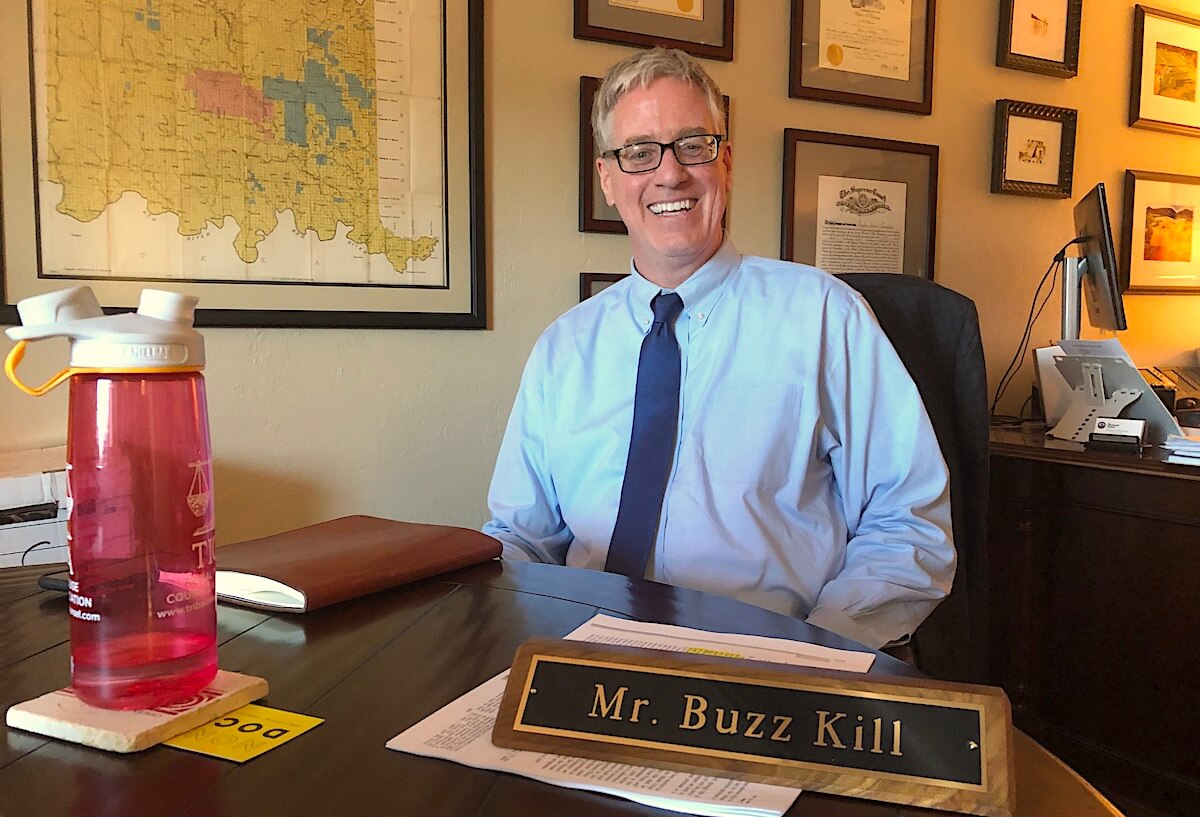

More than 30 sovereign tribal nations that have gaming compacts with the state of Oklahoma are willing to discuss changes to exclusivity fees, but they are flummoxed by indications that Gov. Kevin Stitt wants to renegotiate the compacts altogether, according to the Chickasaw Nation’s chief legal counsel.
Citing Stitt’s infamous July 8 opinion piece in the Tulsa World and his July 5 letter to tribal leaders, Stephen Greetham said it is apparent the governor is “unsatisfied” with the state’s gaming compacts, agreed to by parties — including state voters — 15 years ago.
“The appropriate response to that is to try to engage with government-to-government discussions with the tribes, clearly identifying what the issue is they are seeking to address and then working through intergovernmental relations to figure out what the best remedy for it is,” Greetham said. “That’s not how matters are being approached right now. They are being approached more from a coercive regulatory manner, and the state simply lacks the authority to try and kick in the front door and regulate the tribes.”
If that sounds complicated, welcome to what could be considered the year’s most complex and contentious political battle in Oklahoma for a slate of reasons. Consider the following:
- Oklahoma features more tribal gaming than anywhere in the United States other than California, with more than $4.75 billion in gaming revenues estimated in 2015. Oklahoma has the most gaming properties of any state;
- According to the 1987 U.S. Supreme Court ruling in California v. Cabazon Band of Mission Indians, gaming is a tribal business right;
- But under the subsequently-passed Indian Gaming Regulatory Act, states have the ability to enter into compacts with sovereign tribes to authorize Class III gaming, establish fees for minor regulations and grant certain concessions — such as exclusivity of operation — in exchange for additional fees;
- Oklahoma’s model gaming compact specifies a Jan. 1, 2020, expiration date while also noting a 15-year automatic renewal and an option for governors to request renegotiation. Tribes and the Stitt administration have drastically different interpretations of that clause in “Part 15” of the compact;
- Ahead of Stitt’s announcement that he wants to renegotiate the compacts, a May 2018 U.S. Supreme Court ruling authorized states to legalize sports betting, something that would need to be formalized by the Oklahoma Legislature and has become a factor in the compact negotiations;
- Stitt is an enrolled member of the Cherokee Nation and only the second Native American governor in Oklahoma and U.S. history, but he has not been viewed as active in Cherokee politics or cultural events, a fact that underscores the dichotomy of how tribal identity is seen by native communities and non-native populations. His op-ed reference to being “a Cherokee citizen” may have appeared innocuous to many, but it stood out to some members of Oklahoma tribes, and not in a way helpful to Stitt’s position.
Speaking in his office Aug. 13 , Greetham criticized Stitt’s approach to calling for compact renegotiation.
“The manner in which Gov. Stitt has approached this has essentially made it impossible to meet him at the table for what otherwise might be a productive discussion,” Greetham said.
Stitt seeks ‘best interest of all 4 million people’
While Greetham and other tribal representatives believe Stitt has misstepped in arguing that the compacts expire and should be renegotiated, the governor and his staff have stuck to their guns, despite issuing a second letter that tribal leaders described as “warmer” on Aug. 14.
“Everything is on the table. That’s the best way to frame it,” Deputy Secretary of State Donelle Harder said July 29 in her office. “What the governor wants is a compact that reflects market, that is good for all 4 million citizens of Oklahoma, whether you are a member of a tribe or you are a resident in Broken Arrow. There needs to be a clear demonstration that the final agreement is truly in the best interest of all 4 million people — that it is not to the benefit of just one entity.”
For years, some Republican state leaders and interest groups have argued — mostly in private — that Oklahoma’s gaming compacts are lopsided in favor of the tribes, with relatively low exclusivity fees considering the mountains of money being slid into slot machines and pumped into poker purses.
“The easiest thing to do is simply renew the existing compacts ‘as is,’ rather than do the hard work of closely reviewing and negotiating new compacts that reflect the state of affairs today,” Stitt wrote in his Tulsa World piece. “I believe, however, that voters elected me to look at everything in state government with a fresh eye and, where necessary, make the difficult decisions that are in the best interest of all 4 million Oklahomans.”
Four days later, the Inter-Tribal Council of the Five Civilized Tribes issued a joint statement that questioned Stitt’s “sincerity” while saying Oklahoma has been a positive partner with their nations in recent years.
From then-Cherokee Nation Principal Chief Bill John Baker, Chickasaw Nation Gov. Bill Anoatubby, Choctaw Nation Chief Gary Batton, Muscogee (Creek) Nation Principal Chief James Floyd and The Seminole Nation Chief Greg P. Chilcoat:
We can trace the starting point of our constructive partnership to the carefully crafted and balanced approach represented in the current compact negotiated in a respectful manner between the State of Oklahoma and the sovereign Tribes residing in Oklahoma. This compact represents a continuing and mutually beneficial partnership. The recent action of Governor Stitt puts into question his sincerity to work with us in a cooperative manner moving ahead.
In his interview, Greetham urged the Stitt administration to dive into specifics sooner than later.
“Gov. Stitt has said he has been thinking about this since his campaign,” Greetham said. “He’s the one who is in control of how prepared or unprepared he is to take care of the issues he has put on the table. We are as prepared as we were three years or five years ago.
“He may not be prepared. He needs to get prepared.”
Follow @NonDocMedia on:
State seeking consultant for compact negotiations
In an effort do just that, Stitt’s office distributed a request for proposal July 8 to hire a consultant with experience “negotiating tribal-state gaming compacts in multiple states,” conducting market-analysis and formulating projections. The listed due date for submissions was July 29, the same day Harder discussed the desired consultant’s purpose.
“This person is like having an economic adviser,” Harder said. “They’re not there to go out and seal the deal on anything.”
Harder said it was fair to say Stitt is leading compact negotiations himself, and she pushed back against comparisons between the consultant RFP and the state agency-hired lobbyists Stitt has prohibited.
“It’s absolutely different from a contract lobbyist. This person will have no interaction with the Legislature. They are not there to advocate to get our plan through or to advocate to get our plan accepted by any other entity,” Harder said. “They’re there to look at what is market in other states and to help advise us on what makes sense so that the tribes — as sovereign nations — have the opportunity to expand their businesses and their potential while also ensuring that the state is continuing to deliver core public services through the fees generated.”
Those fees — paid by tribes for “exclusive” rights to operate gaming establishments across Oklahoma — are largely set along a sliding scale: 4 percent of a tribe’s first $10 million in adjusted gross revenue on Class III electronic games, 5 percent of a tribe’s second $10 million and 6 percent of all Class III electronic gaming revenue beyond $20 million. Additionally, non-house banked table games yield a flat 10 percent fee for the state.
From November 2015
State to review gaming compact if ‘sun rises in the east’ by Tres Savage
Stitt and his team have argued that the exclusivity fees in Oklahoma’s compacts are below average in a tribal gaming market that is changing nationally.
“In November 2018, voters in our neighboring state of Arkansas approved four new casinos in the state, two of which will be bid on by tribes from Oklahoma, according to media reports,” Stitt wrote in the Tulsa World. “In Arkansas, the fee will start at 13 percent and max out at 20 percent.”
Greetham, however, referenced a U.S. Government Accountability Office report from June 2015 that shows Oklahoma’s existing exclusivity fee agreement to be roughly in the middle among 276 compacts that existed in October 2014. In states like Connecticut and New York, fee percentages are far higher, and Florida has been in a protracted battle over gaming exclusivity fees paid by the Seminole Nation. (In Florida, the exclusivity agreement is not based solely on percentages.)
Greetham, a former professor of American Indian and Indigenous peoples law at the University of Oklahoma College of Law, said Florida and Connecticut have only one and three tribes participating in gaming, respectively.
“Exclusivity there has different value,” he said. “Revenue share rate is a product of a negotiation, so it’s driven by what the parties to that negotiation are looking for. It’s not a tax.”
He noted that, in the state of Washington, revenue share is paid to local governments instead of the state. In California, he said, such fees are placed into a trust and allocated from there, often to sovereign tribal nations that do not conduct gaming.
“It’s hard to make just a straight line comparison,” Greetham said.
On that, Harder agrees.
“Not all compacts have fee structures,” she said. “Other compacts have other ways of having an agreement with the state to pay for those roads and bridges around their infrastructure, to pay for their education around the casinos or the facilities.”
Harder said Wednesday that the consultant RFP had been turned over to Oklahoma Attorney General Mike Hunter, whose communications director confirmed the contract has not yet been awarded.
As the state’s top lawyer, Hunter has been asked questions about the compact negotiations in recent weeks, as Stitt indicated in his August letter that Hunter and a pair of legislative designees are now being included in negotiations.
“I think it’s fair to say it’s a team approach,” Hunter said Aug. 20. “I know I speak for the governor and Legislature. It is the intention that we sit down respectfully and clearly with the tribes to understand everybody’s objectives. It’s frankly just a bread-and-butter negotiation.”
Hunter declined to discuss his legal opinion about whether the compacts expire at the end of the year.
Which team will fumble first? +120 / -180

While Stitt and tribal leaders disagree over whether the compacts expire Jan. 1, Stitt’s letter from Aug. 14 asked that such a disagreement not get in the way of other gaming negotiations.
Several other potential areas of discussion seem to exist.
Since at least 2018, lawmakers and tribal representatives at the State Capitol have been discussing the opportunity to legalize sports wagering in Oklahoma, a state that borders Texas and already receives about 40 percent of its casino visits from out-of-state visitors, according to the Oklahoma Indian Gaming Association.
“It’s our understanding that some (tribes) are (interested in sports betting),” Harder said in July.
House Majority Floor Leader Jon Echols (R-OKC) said July 30 that he has heard the same thing.
“In order to engage in sportsbook, that would have to be passed and approved by the Legislature,” said Echols, an attorney.
Greetham, who jokingly identifies as “a Canadian anchor baby,” said the Chickasaw Nation and other tribes previously pitched state leaders about authorizing sportsbook in exchange for “a generous revenue share,” but he said the conversation never gained traction.
“I don’t blame the state for that. I think, quite honestly, the tribes aren’t really sure about what the business model is to take advantage of it,” he said. “Sportsbook is not a lucrative offering. The margins are very low, and it’s pretty easy to lose money on offering sportsbook.”
Saying the public has interest, however, would appear to be a lucrative prop.
On Wednesday, the American Gaming Association released a survey that estimates 38 million Americans — or 15 percent of the adult U.S. population — intends to bet on NFL games this season. Local interest for wagering on college football or the NBA could be even larger.
Beyond sportsbook, tribes and Oklahoma leaders also appear to be discussing the future of gaming in general. Casinos across the country have been pondering how to replace their aging slot-machine clientele, an industry challenge faced by the 35 tribes with gaming compacts in Oklahoma.
Why sit in a smoke-filled casino and pull a lever for hours when younger Oklahomans can access hundreds of gaming options from their smartphones?
“In any business, you’re constantly trying to project what the future holds for you,” Greetham said. “This is outside of my lane as a lawyer, but the business folks are pretty sophisticated. We didn’t grow our operations to what they are today with just luck.”
‘None of us are going anywhere’
As state and tribal leaders hold their cards close to their vests and determine how much to bluff, entities on both sides of the argument have been messaging on social media and launching websites.
Tribal interests are emphasized on UnitedForOklahoma.com, while FairCompactForOklahoma.com calls the current gaming compacts “outdated.” It’s not clear who is financing or running either site.
Echols emphasized his belief that an agreement can be struck.
“I’m interested in watching, and I believe what the governor said: That there is a way to find a win for the tribes and a win for the state, and I’m excited that everyone is trying to find that,” Echols said.
Harder agreed.
“The governor is 100 percent intending to come to an agreement before the end of the year and to the benefit of everyone,” Harder said. “It is in no way going to be held up on his end owing to political jockeying.”
Greetham emphasized the need for tribes to receive a plan from Stitt, but he said the Chickasaw Nation and other nations remain optimistic for an amicable solution.
“I don’t think there’s anyone involved in this dispute right now who wants things to go sideways. This has been an unfortunate beginning to a conversation within an otherwise good relationship between the tribes and the state,” he said. “None of us are going anywhere, so we have to work together for the benefit of our shared citizenry.”
(Update: This story was updated at 6:45 a.m. Thursday, Sept. 5, 2019, to include additional information.)





















